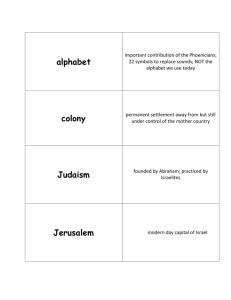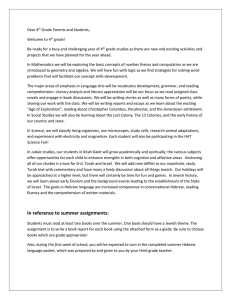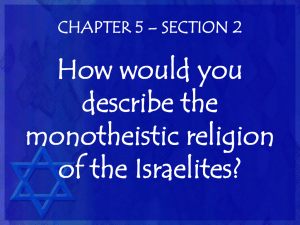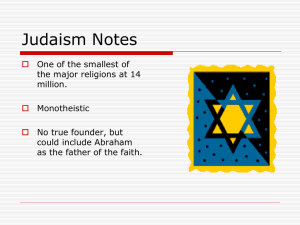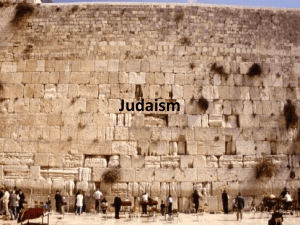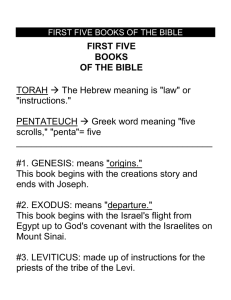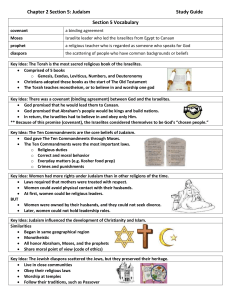Ch. 5 test review – 6th grade ____ 1. According to the Bible, when
advertisement
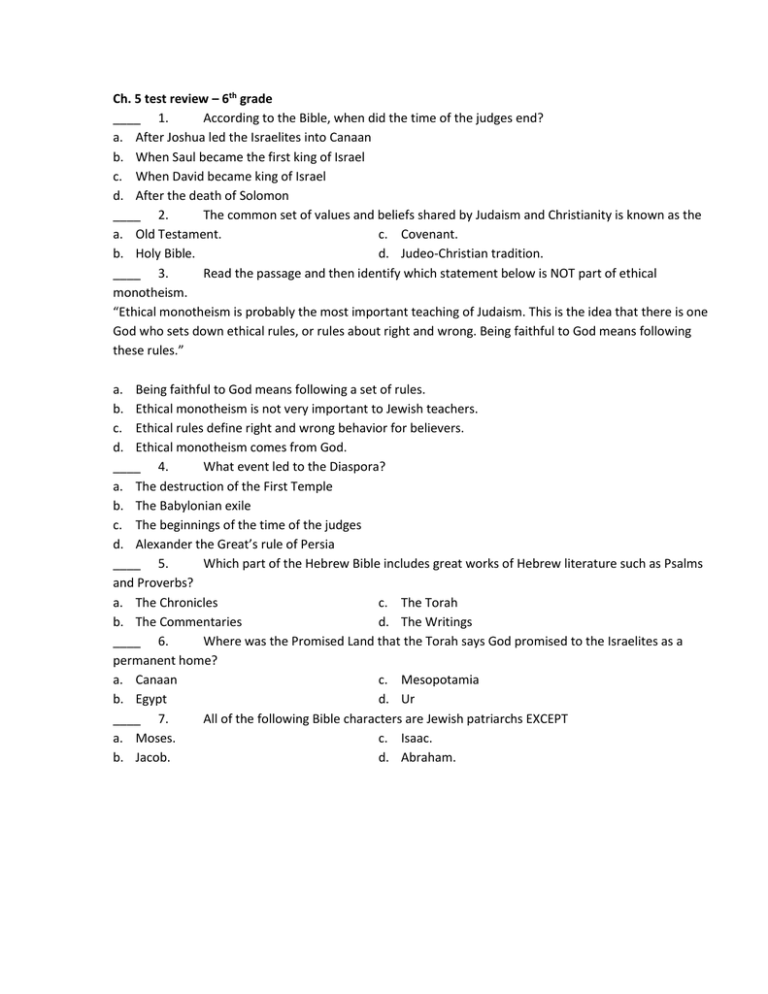
Ch. 5 test review – 6th grade ____ 1. According to the Bible, when did the time of the judges end? a. After Joshua led the Israelites into Canaan b. When Saul became the first king of Israel c. When David became king of Israel d. After the death of Solomon ____ 2. The common set of values and beliefs shared by Judaism and Christianity is known as the a. Old Testament. c. Covenant. b. Holy Bible. d. Judeo-Christian tradition. ____ 3. Read the passage and then identify which statement below is NOT part of ethical monotheism. “Ethical monotheism is probably the most important teaching of Judaism. This is the idea that there is one God who sets down ethical rules, or rules about right and wrong. Being faithful to God means following these rules.” a. Being faithful to God means following a set of rules. b. Ethical monotheism is not very important to Jewish teachers. c. Ethical rules define right and wrong behavior for believers. d. Ethical monotheism comes from God. ____ 4. What event led to the Diaspora? a. The destruction of the First Temple b. The Babylonian exile c. The beginnings of the time of the judges d. Alexander the Great’s rule of Persia ____ 5. Which part of the Hebrew Bible includes great works of Hebrew literature such as Psalms and Proverbs? a. The Chronicles c. The Torah b. The Commentaries d. The Writings ____ 6. Where was the Promised Land that the Torah says God promised to the Israelites as a permanent home? a. Canaan c. Mesopotamia b. Egypt d. Ur ____ 7. All of the following Bible characters are Jewish patriarchs EXCEPT a. Moses. c. Isaac. b. Jacob. d. Abraham. ____ 8. Outside of Israel, where do the largest number of Jews live today? a. In the rest of Southwest Asia c. In Latin America b. In Europe and Russia d. In the United States ____ 9. By which ancient event do historians mark the beginning of the Jewish Diaspora? a. The Babylonian Captivity c. The rule of Cyrus the Great b. The Assyrians’ conquest of Israel d. Joshua’s capture of Jericho ____ 10. Obedience to the Hebrew Bible’s commandment to “Love your fellow [human being] as yourself” is the reason that many Jews a. become involved in efforts to fight discrimination. b. believe that God’s laws apply equally to everyone. c. engage in the practice of monotheism. d. have a strong connection to the nation of Israel. ____ 11. According to the Bible, where did the Israelites live for 40 years before their return to their Promised Land? a. Canaan c. The Sinai desert b. Egypt d. The Mesopotamian city of Ur ____ 12. All of the following are part of the Biblical definition of “judge” except a. Judges served as leaders in defense of Jewish lands. b. Judges could never be female. c. Sons of judges were not automatically judges themselves. d. Judges might be prophets or soldiers. ____ 13. Which of the following is NOT a legacy of Judaism? a. The Judeo-Christian tradition b. The Bible c. The belief in the resurrection of Jesus d. The belief in one supreme, invisible God ____ 14. Which event resulted in the kingdom of Israel becoming divided? a. The Babylonian Captivity c. The death of King Solomon b. The conquest by the Assyrians d. Joshua’s capture of Jericho ____ 15. The traditional beginnings of Judaism are described in an ancient text known as the a. Covenant. c. Ten Commandments. b. Old Testament. d. Torah. ____ 16. Why did God give Moses the Ten Commandments? a. To help Moses lead the Israelites out of Egypt b. To provide the Israelites with ethical laws c. To prepare the Israelites for their escape from slavery d. To guide the Israelites to the Promised Land ____ 17. What do Jews believe to be the most important way to show their faithfulness to God? a. Going to temple c. Learning to speak Hebrew b. Praying five times a day d. Following God’s laws ____ 18. Which other biblical figure besides Abraham led the Israelites into the Promised Land of Canaan? a. Isaac c. Joshua b. Jacob d. Moses ____ 19. Which activity is least important to the good practice of Judaism? a. Studying God’s laws c. Becoming a rabbi b. Working for justice d. Observing the Sabbath ____ 20. According to the graph above, which of the following statements is accurate about the Jewish population in France compared to that of the rest of Europe and Russia? a. The Jewish populations of France and the rest of Europe and Russia are roughly equal. b. The Jewish population of the rest of Europe and Russia is one third that of France. c. France has around half of the Jewish population found in the rest of Europe and Russia. d. The Jewish population of the rest of Europe and Russia is three times that of France. ____ 21. According to the graph above, which three regions have a similar percentage of Jewish population? a. Rest of Europe, Russia, and the United States b. France, rest of the world, and Latin America c. Canada, rest of the world, and France d. France, Canada, and Latin America ____ 22. Where in the Hebrew Bible is the traditional history of the Jewish people found? a. In the Torah b. In the Prophets and the Torah c. In the Writings and the Prophets d. In the Torah, the Prophets, and the Writings ____ 23. Which Israelite captured Jerusalem and made it the capital of the Kingdom of Israel? a. David c. Moses b. Joshua d. Solomon ____ 24. Where was the birthplace of the Jewish patriarch Abraham? a. Canaan c. Israel b. Egypt d. Mesopotamia ____ 25. Which part of the modern world has been least affected by the Jewish Diaspora? a. Australia c. South America b. Europe d. Southeast Asia ____ 26. Which Jewish writing is the best resource for helping Jews to understand God’s laws? a. The Scriptures c. The Tanakh b. The Talmud d. The Torah ____ 27. The book of Exodus states that the Israelites were led out of slavery in Egypt by a. Abraham. c. Joshua. b. Jacob. d. Moses. ____ 28. Which two conquerors were most responsible for forcing Jews from Israel and scattering them across the ancient world? a. Assyrians and Babylonians c. Persians and Egyptians b. Babylonians and Persians d. Egyptians and Greeks 29. Jews are called to practice ____________, or acting or living in a way that is ethically right and obeys God’s laws. 30. The Israelites practiced _____________, which means that they believed in only one God. 31. The ____________ is the best resource for helping Jews understand God’s law. 32. The story of the Jewish people begins with the Bible’s account of _______________ traveling with his family from Mesopotamia to a land called Canaan. Answer questions 33 – 40 at home and bring it in for the test on a separate sheet of paper. 33. Describe the roles that Moses and Joshua played in the Israelites’ settlement in the Promised Land, according to the Hebrew Bible. 34. How did the Land of Israel become the province of Palestine? 35. Name and describe the three main sections of the Hebrew Bible. 36. Why is the study of God’s laws so important in Judaism? 37. Name three reasons why Moses is an important figure in the history of Judaism. 38. Compare and contrast the Hebrew Bible and the Christian Old Testament. 39. Explain why the study of the Hebrew Bible is such an important part of the practice of Judaism. 40. Explain what the Diaspora is, how and why it took place, and how it affected the Jewish people.
